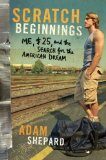Last week I mentioned that I was reading the book Scratch Beginnings: Me, $25, and the Search for the American Dream, by Adam Shepard. The book chronicles the real-life journey of Shepard, who upon finishing college turned over all his worldly possessions to his brother, and began a social experiment of his own. Armed with only $25 and a mostly empty gym bag, he hit the streets of Charleston, SC to try to make it out of poverty in one year or less.
In the first 25 pages of the book you are instantly reminded of what it is like to have nothing but the clothes on your back. Actually, I shouldn’t say “reminded” because many of us have never experienced that feeling before. I’m not talking about being down and out for a few weeks, or struggling to make ends meet, I’m talking about having absolutely nothing. No car, no home, no job, no money, no food, no health care, and no network of friends to help. And from this Shepard was to rise to the ranks for the fully employed, find a place to live and sock away a respectable about of money in savings.
Besides an engaging look at what it’s really like to be homeless in America, Scratch Beginnings made me aware of a couple things that I had forgotten since becoming accustomed to a steady paycheck and having all of my basic needs met without giving it much thought. There are many people out there wondering where they will get their next meal, or their next job, or their next opportunity for work. This is especially true in this time of prolonged recession with many people finding themselves unemployed.
Shepard describes his first big win after a day of hard labor netted him $28.61. Combined with the whopping $20.27 he had left over from his $25 starter fund, this left him with $48.88 to start building a personal supply of basic items.
From the book:
Before heading to her home on the north side of town, Cicely dropped me off up the street from the EasyLabor at Family Dollar, where I made my money count. All of it. I bought six pairs of underwear, a six-pack of socks, six white undershirts, a stick of deodorant, a toothbrush, an eight-pack of Ivory soap, shampoo and conditioner, a towel, a washcloth, a roll of toilet paper for emergencies, and a week-long supply of an assortment of potted meat and crackers that I would eat for lunch.
It’s probably safe to assume this list doesn’t represent what most of our lists looked like from our most recent shopping trip. Notice there were no CDs, no bottles of expensive wines, no home decorating items, and no expensive toys. Nope, just basic necessities. Shepard was satisfying those needs for shelter, clothing and food first. Later, he would go on to add transportation, a job, and his own place to stay by sticking to his initial plan of only spending money on things that were absolutely necessary to his survival.
Most reading this are probably in much better situations than those described in the book living in the Crisis Ministries shelter in Charleston, SC. However, that doesn’t mean we cannot apply these same lessons. Intellectually, we all know that savings in merely a function of spending less than you earn. But many people are convinced a requirement for building savings is earning a lot of money. Not true.
In fact, I know plenty of examples of people who earn a ton of money and have very little, if any, savings. Conversely, I know people who earn a modest amount of money, but have healthy emergency funds and long-term savings. Scratch Beginnings really drove that point home for me, and from a frugal living perspective was the major take away from following Shepard’s story.
I would be remiss if I didn’t add a disclaimer for those interested in reading Shepard’s book. The language is raw and unedited from conversations he had with those in the shelter and at various jobs. It did not bother me, but it may not be suitable for young readers (pre-teen or younger). In a way I wish some of that had been left out of the book to expand the audience to younger people, but in the end I was glad Shepard left it in because it added to the authenticity of his experience. An experience that I hope more people will read and learn from in their struggle to lift themselves out of a life of poverty.

